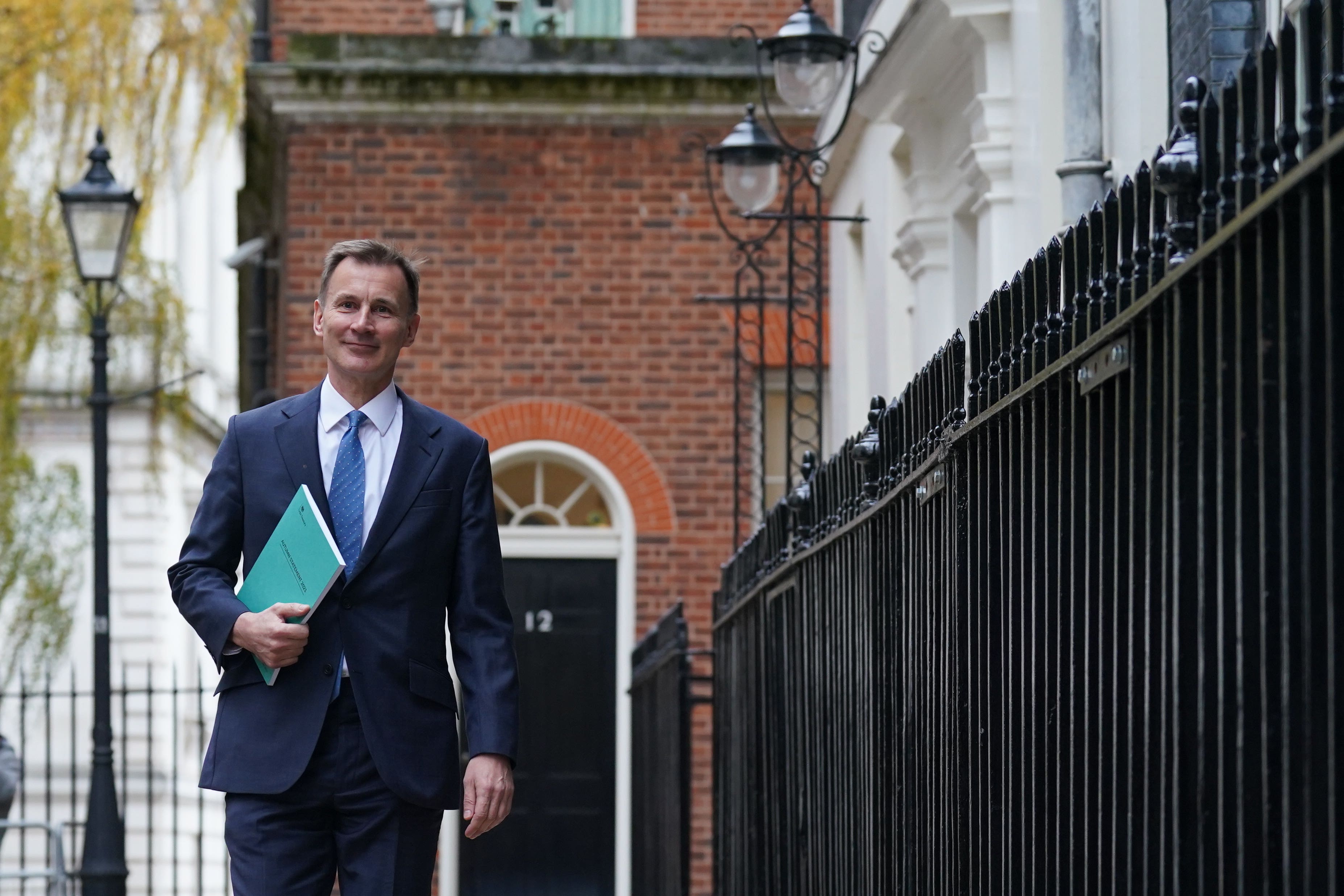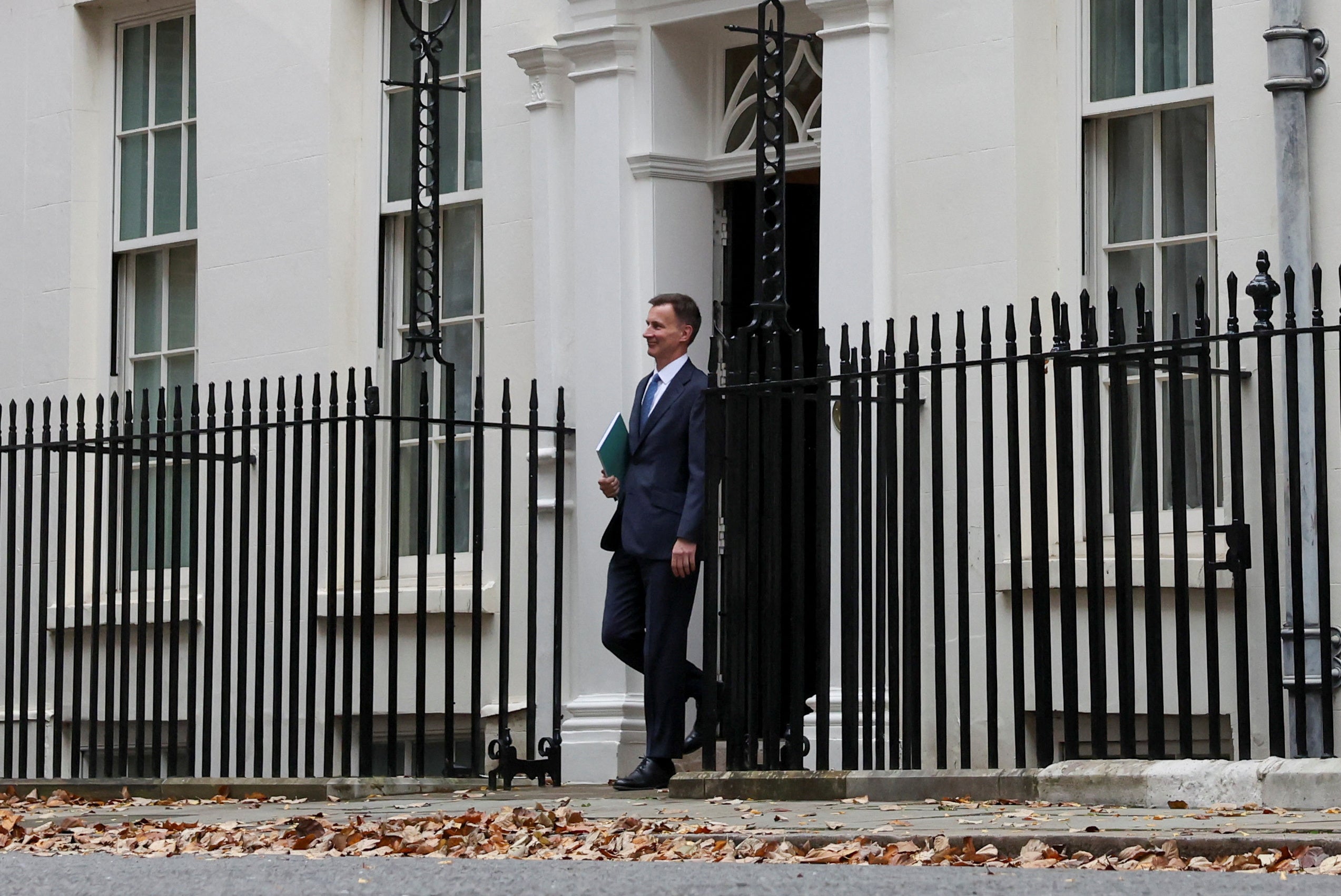Key measures included in Jeremy Hunt’s autumn statement and what’s missing
Chancellor reveals 2% national insurance cut, as he claims Tory economic plan is ‘working’
Your support helps us to tell the story
From reproductive rights to climate change to Big Tech, The Independent is on the ground when the story is developing. Whether it's investigating the financials of Elon Musk's pro-Trump PAC or producing our latest documentary, 'The A Word', which shines a light on the American women fighting for reproductive rights, we know how important it is to parse out the facts from the messaging.
At such a critical moment in US history, we need reporters on the ground. Your donation allows us to keep sending journalists to speak to both sides of the story.
The Independent is trusted by Americans across the entire political spectrum. And unlike many other quality news outlets, we choose not to lock Americans out of our reporting and analysis with paywalls. We believe quality journalism should be available to everyone, paid for by those who can afford it.
Your support makes all the difference.Jeremy Hunt has declared Britain’s economy “back on track” as he announced a shock 2 per cent cut to national insurance and extended a £11bn-a-year tax break for businesses.
Rishi Sunak’s chancellor said he was slashing national insurance contributions for 27 million workers from January 2024 in a bid to boost the party’s fortunes in the polls ahead of the general election.
Mr Hunt claimed his plan for the British economy is “working”, but Labour accused the Tories of “making working people worse off”. Here’s a closer look at what’s in the autumn statement:
What’s in:
National Insurance cut by 2%
The chancellor announced a cut to national insurance by 2 per cent for 27 million people on Wednesday.
Despite saying only two months ago that slashing tax rates was “virtually impossible”, Mr Hunt has decided the public finances allow for personal tax cuts right now.
Workers earning up to £50,200 currently pay 12 per cent in national insurance, so will now pay 10 per cent. It means somebody on the nation’s average salary of £35,000 will save more than £450 a year.
Mr Hunt said there would be emergency legislation to bring it in from January. The chancellor said the “high employment taxes incentivises the hard work we should be encouraging”.
Living wage rise
There was good news for low-paid workers, with the minimum wage rising from £10.42 to £11.44 per hour from April, the chancellor confirmed.
Known officially as the National Living Wage, Mr Hunt said the rate will now apply to 21 and 22-year-olds for the first time – having only been available from the age of 23. The chancellor also confirmed that 18 to 20-year-olds will receive a £1.11 hourly rise to £8.60.
The change means a full-time employee aged 23 on the wage will receive a rise worth £1,800 a year.
Benefits rise with inflation at 6.7%
There was good news for those receiving Universal Credit and other benefits, which will rise with September’s inflation figure of 6.7 per cent.
Mr Hunt was reportedly considering a big squeeze on payments by using the October’s inflation figure of 4.6 per cent – rather than September’s higher figure – in a bid to save £3bn.
He said the Local Housing Allowance (LHA) would also be increased next year – saying it would an means an extra £800 of support.

New benefits crackdown
Mr Hunt confirmed a new push to crack down on benefit claimants who do not find work within 18 months. Payments are expected to be cut by thousands of pounds a year if people do not comply with new rules.
Accused of trying the “punish” disabled people, the government says claimants could also be cut off from free prescriptions and dental treatment, help from energy suppliers and cheaper mobile phone packages.
State pension to rise at 8.5%
Mr Hunt announced that the state pension will rise by 8.5 per cent from April, in line with the triple-lock commitment, worth up to £900 a year. The Tory pledge means the government is committed to hike the rate average earnings, inflation or 2.5 per cent – whichever is highest.
Although the chancellor had considered “tweaking” the formula, stripping out the bonuses to increase pensions by only 7.8 per cent, he has opted to avoid negative headlines about broken promises.
The Treasury has also announced a £320m plan to help unlock pension fund investment for technology and science schemes.

Tax cut for self-employed
For the self-employed, Mr Hunt has abolished class 2 national insurance contributions. It will save the average self-employed worker £192 a year, he said.
The chancellor also cut the class 4 national insurance contributions from 9 per cent to 8 per cent. Taken together the moves will save self-employed people an average of £350 a year.
Tax break for business investment extended
Mr Hunt has extended the temporary tax break knows as “full expensing”, aimed at allowing businesses to offset any investments.
The £11bn-a-year tax break – which effectively lets firms pay less corporation tax – was set to expire in 2026. But it will now be in place permanently.
Alcohol duty freeze
Mr Hunt has announced a freeze on alcohol duty. The duty on many spirits and wines rose in August in the first increase since 2020 – but the chancellor has now frozen the rate until next August under pressure from the hospitality industry.
Mr Hunt also reaffirmed the government’s so-called Brexit pubs guarantee, meaning pints in pubs are taxed less than those bought from shops.
Mr Hunt also extended a freeze on the business rates multiplier for small businesses. And he extended a 75 per cent discount on business rates for retail, hospitality and leisure businesses which have struggled to bounce back after Covid.

£4.5bn fund to boost green technology
Mr Hunt has committed £4.5bn in green technology in a bid to keep Britain “at the forefront of the global transition to net zero”. Around £2bn is set to go to the car industry.
People living near planned pylons and electricity substations are set to receive up to £10,000 off their bills over a decade, in a bid to end delays to infrastructure projects over objections by so-called “nimby” campaigners.
Moves to ease housing and planning backlog
Local authorities will be able to recover the full costs of planning applications if they prompt deadlines, Mr Hunt announced. He also revealed legislative plans allow house to be converted into two flats.
What’s out:
No inheritance tax cut
Mr Hunt is thought to have considered slashing inheritance tax to help wealthy homeowners. But he has decided against such a move – pushing back the possible move until next spring, at the earliest. Red wall Tory MPs had warned it would have been unwise to be seen to help the rich during the cost of living crisis.
No change to income tax
Mr Sunak and Mr Hunt had been to have been “mulling over” a shock cut to income tax in recent days. But the chancellor opted to cut national insurance instead in his eleventh-hour move.






Join our commenting forum
Join thought-provoking conversations, follow other Independent readers and see their replies
Comments